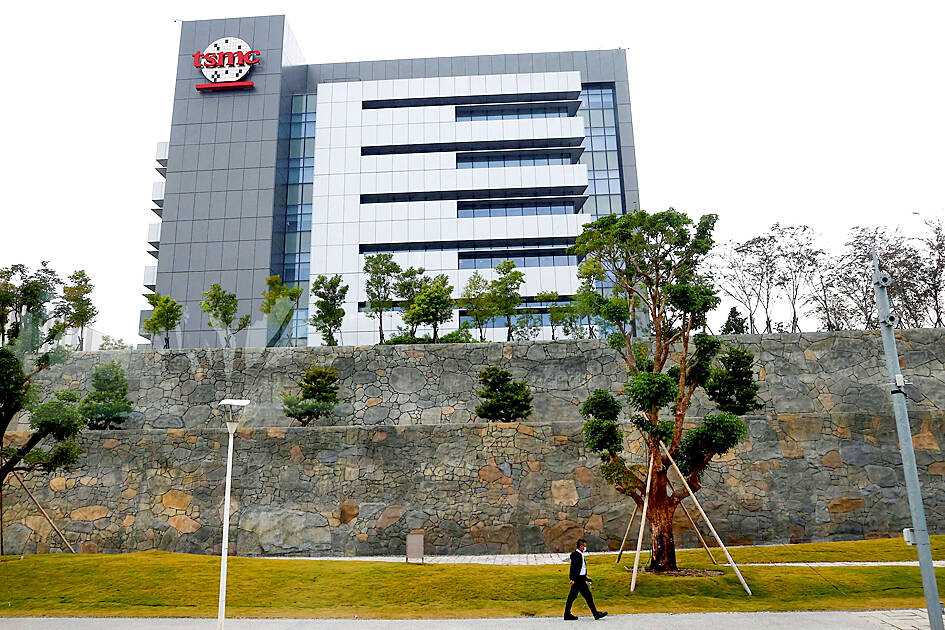Taiwan Semiconductor Manufacturing Co (TSMC, 台積電) yesterday said it has obtained permanent authorization from the US government, confirming that the items and services subject to US export control regulations could continue to be provided to TSMC’s Nanjing fab without the need for vendors to get individual licenses.
Issuance of the validated end-user (VEU) authorization maintains the status quo for production of semiconductors at its Nanjing fab, TSMC said in an e-mail.
In October 2022, the chipmaker secured a one-year general authorization from the US government, which allows TSMC to continue its fab’s operations in Nanjing, China, the chipmaker said.

Photo: Ann Wang, Reuters
The general authorization has been renewed and extended to until May 31 this year, it added.
TSMC operates a 12-inch fab in Nanjing utilizing 16-nanometer technology and less advanced 28-nanometer process technology.
It said it is expanding its 28-nanometer chip capacity there to address increasing demand from customers in China.
“Recently, the US Department of Commerce issued a Validated End User authorization to TSMC Nanjing Co Ltd (台積電 (南京) 有限公司),” TSMC said. “This formal VEU authorization replaces ad hoc letter authorizations the Commerce Department had issued previously since October 2022.”
To prevent China from advancing its semiconductor manufacturing capabilities, the US has tightened export controls for advanced computing integrated circuits (ICs), computer commodities that contain such ICs and certain semiconductor manufacturing items. It also tightened controls on transactions involving items for supercomputer and semiconductor manufacturing end-uses.
The new controls added new license requirements for items subject to the US Export Administration Regulations that would be sold to a semiconductor fabrication facility in China, as well as on US persons’ activities supporting such facilities or semiconductor manufacturing items.

‘SWASTICAR’: Tesla CEO Elon Musk’s close association with Donald Trump has prompted opponents to brand him a ‘Nazi’ and resulted in a dramatic drop in sales Demonstrators descended on Tesla Inc dealerships across the US, and in Europe and Canada on Saturday to protest company chief Elon Musk, who has amassed extraordinary power as a top adviser to US President Donald Trump. Waving signs with messages such as “Musk is stealing our money” and “Reclaim our country,” the protests largely took place peacefully following fiery episodes of vandalism on Tesla vehicles, dealerships and other facilities in recent weeks that US officials have denounced as terrorism. Hundreds rallied on Saturday outside the Tesla dealership in Manhattan. Some blasted Musk, the world’s richest man, while others demanded the shuttering of his

ADVERSARIES: The new list includes 11 entities in China and one in Taiwan, which is a local branch of Chinese cloud computing firm Inspur Group The US added dozens of entities to a trade blacklist on Tuesday, the US Department of Commerce said, in part to disrupt Beijing’s artificial intelligence (AI) and advanced computing capabilities. The action affects 80 entities from countries including China, the United Arab Emirates and Iran, with the commerce department citing their “activities contrary to US national security and foreign policy.” Those added to the “entity list” are restricted from obtaining US items and technologies without government authorization. “We will not allow adversaries to exploit American technology to bolster their own militaries and threaten American lives,” US Secretary of Commerce Howard Lutnick said. The entities

Taiwan’s official purchasing managers’ index (PMI) last month rose 0.2 percentage points to 54.2, in a second consecutive month of expansion, thanks to front-loading demand intended to avoid potential US tariff hikes, the Chung-Hua Institution for Economic Research (CIER, 中華經濟研究院) said yesterday. While short-term demand appeared robust, uncertainties rose due to US President Donald Trump’s unpredictable trade policy, CIER president Lien Hsien-ming (連賢明) told a news conference in Taipei. Taiwan’s economy this year would be characterized by high-level fluctuations and the volatility would be wilder than most expect, Lien said Demand for electronics, particularly semiconductors, continues to benefit from US technology giants’ effort

Minister of Finance Chuang Tsui-yun (莊翠雲) yesterday told lawmakers that she “would not speculate,” but a “response plan” has been prepared in case Taiwan is targeted by US President Donald Trump’s reciprocal tariffs, which are to be announced on Wednesday next week. The Trump administration, including US Secretary of the Treasury Scott Bessent, has said that much of the proposed reciprocal tariffs would focus on the 15 countries that have the highest trade surpluses with the US. Bessent has referred to those countries as the “dirty 15,” but has not named them. Last year, Taiwan’s US$73.9 billion trade surplus with the US